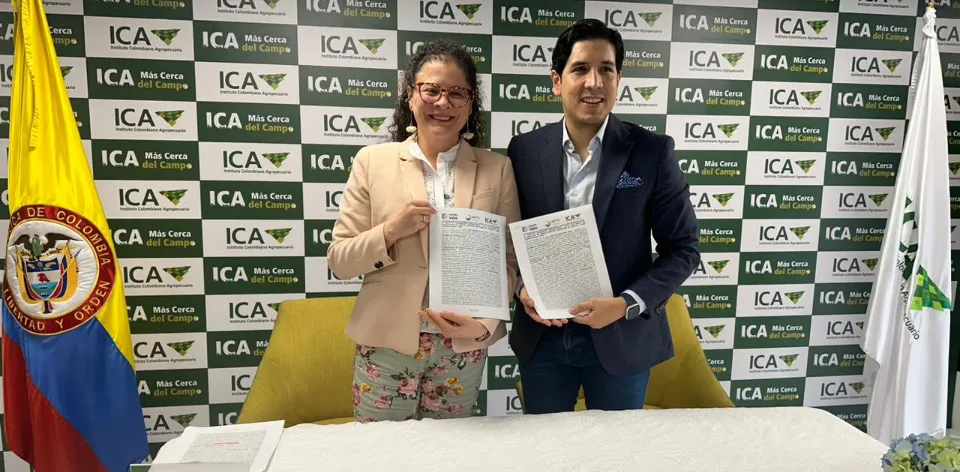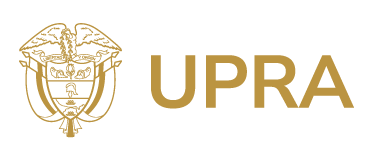 27/6/2024
27/6/2024
The ICA and UPRA Join Forces to Strengthen National Agricultural Production

The ICA and UPRA are entities affiliated with the Ministry of Agriculture and Rural Development (MADR) that work together to optimize the exchange of agricultural sector information in an agile, timely, and reliable manner.
Bogotá D. C. (@UPRAColombia, @claudialili76). The Colombian Agricultural Institute (ICA) and the Agricultural and Rural Planning Unit (UPRA) signed the ICA-UPRA Framework Cooperation Agreement, which seeks to combine efforts between the two entities to exchange information, strengthen interinstitutional technical capacity, and develop agreements and projects aimed at improving their instruments and information systems, to enhance the development of the agricultural sector.
With the signing of this agreement, the two entities will work to optimize information flows and, consequently, decision-making related to adapting agricultural production to climate change, traceability of animal and plant origin agricultural products, among other strategic projects of each entity, which will contribute to technological development in agriculture, as well as increase productivity and competitiveness in the country.
The protocol signing event of the Framework Cooperation Agreement was held at the national offices of ICA in Bogotá, and was attended by ICA representatives, including General Manager Juan Fernando Roa, Deputy Manager of Plant Protection Luis Gerardo Arias, Deputy Manager of Animal Protection Edilberto Brito, and Head of the Information Technology Office Johnnatan Andrés Figueroa Hidalgo; and by UPRA representatives, including General Director Claudia Liliana Cortés López, Technical Director of Efficient Land Use and Land Adaptation Alexander Rodríguez, and Technical Advisor Adriana Pérez Orozco.
With a duration of three years, the agreement will be executed nationwide in three lines of cooperation: i) exchange of technical, scientific, and sanitary information for animal and plant species; ii) formulation, preparation, and execution of joint policies, plans, programs, projects, and procedures that encourage activities to develop the agricultural sector and its products; and iii) strengthening of joint capacities.
This agreement stems from the need to achieve the state objectives, which include promoting technical and business assistance to improve the income and quality of life of farmers; for which cooperation between entities is essential to facilitate the fulfillment of their functions.
Furthermore, within the framework of the priorities defined for the Colombian state and the agricultural sector, it is established to create and implement the Plant and Animal Traceability System, in coordination with agricultural sector entities, for which ICA and UPRA provide key elements.
To contribute to the achievement of state objectives, UPRA aims to guide land management policy for agricultural uses and has been working on establishing criteria, guidelines, and instruments for agricultural rural planning, monitoring and evaluating rural property social ordering processes, regularizing the rural land market, efficient use of rural land, and rural land adaptation.
For its part, ICA aims to contribute to the sustainable development of the agricultural and aquaculture sector by preventing, monitoring, and controlling sanitary, biological, and chemical risks for animal and plant species, and applied research to protect the health of people, animals, and plants, and ensure trade conditions.
In this regard, UPRA will systematically and methodically use and analyze the information produced by ICA related to the prevention, monitoring, and control of officially controlled pests and diseases, as well as all sanitary (plant and animal) constraints nationwide that impact different production systems.
It is worth noting that ICA and UPRA joined efforts in 2020 to collect and coordinate information generated by the entities regarding pests and diseases in prioritized production systems, where ICA provided information on prioritized disease outbreaks, such as wild-origin rabies (ROS), vesicular stomatitis, and foot-and-mouth disease. This information has been used by ICA as a tool to project vaccination against ROS to date; valuable data that allowed the creation of the Agricultural Risk Management Information System (SIGRA) and other relevant sector analyses, which are essential for improving the analyses carried out by UPRA.
Director Claudia Cortés emphasized the importance of the agreement with ICA: "We signed an agreement that seeks to strengthen information exchange, enhance technical components at the interinstitutional level, promote agreements and projects that allow us to optimize instruments and information systems, and improve institutional capacities; thus, we enhance the development of the agricultural sector in the Government of Change."
Meanwhile, Juan Fernando Roa Ortiz stated: "We are very pleased to sign this agreement with UPRA because we are confident that working together, we will continue to deliver significant results for the agricultural sector, improving the income and quality of life of rural producers, and increasing the sector's efficiency and competitiveness."

